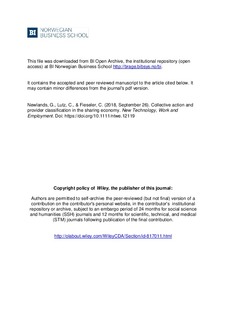Collective Action and Provider Classification in the Sharing Economy
Journal article, Peer reviewed
Accepted version
Permanent lenke
http://hdl.handle.net/11250/2571837Utgivelsesdato
2018Metadata
Vis full innførselSamlinger
- Publikasjoner fra CRIStin - BI [1015]
- Scientific articles [2181]
Sammendrag
Conditions in the sharing economy are often favourably designed for consumers and platforms but entail new challenges for the labour side, such as substandard social-security and rigid forms of algorithmic management. Since comparatively little is known about how providers in the sharing economy make their voices heard collectively, we investigate their opinions and behaviours regarding collective action and perceived solidarities. Using cluster analysis on representative data from across twelve European countries, we determine five distinct types of labour-activists, ranging from those opposed to any forms of collective action to those enthusiastic to organise and correct perceived wrongs. We conclude by conjecturing that the still-ongoing influx of new providers, the difficulty of organising in purely virtual settings, combined with the narrative of voluntariness of participation and hedonic gratifications might be responsible for the inaction of large parts of the provider base in collectivist activities.
